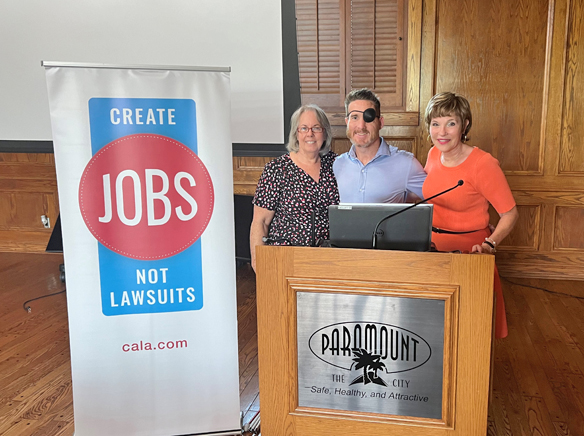
Courtesy of Paramount Chamber of Commerce
Tanner Gers, a CASp inspector for Americans with Disabilities Act website requirements, and founder and managing director of AccessAbility Officer, shared his personal journey of living in the sighted world to how he now lives as a blind man teaching business owners what they need to do to protect themselves from abusive ADA website lawsuits. Tanner has been blind since 2004 when he was involved in a terrible auto accident.
You can say he’s seen it all even unsighted.
Tanner shared his experience as a sighted man and blind man accessing websites, the issues he encounters daily, and how he works with businesses to make accessing their websites more accessible for everyone.
Fifteen local small business owners joined for a special lunch and learn program, The Offense & Defense of website accessibility, that focused on how to check and fix your website for Americans with Disabilities Act compliance violations. The event was sponsored by the Paramount Chamber of Commerce in coordination with California Citizens Against Lawsuit Abuse, a grassroots movement pushing for legal reform.
Barbara Crowson, executive director of the Paramount Chamber of Commerce, with support from Southern California Gas Company, has made it her mission to provide as much information and training for her small business owners in Paramount and surrounding communities to protect themselves from abusive lawsuits stemming from Americans with Disabilities Act lawsuits, including both brick and mortar types of suits and those that involve websites. This event was timely due to a rising number of ADA lawsuits in Paramount since January.
Together, they were very pleased that Mr. Gers spent the good part of his afternoon sharing his wealth of knowledge and encouraging businesses to be pro-active when it comes to protecting themselves from abusive ADA website lawsuits. “Disability happens,” said Gers. “Our family members can become disabled and for people 51 years of age or older, there is a 40% chance you will be out with a disability for 6 months this year. “Nearly twenty percent of people in the United States identify as having a disability and it’s probably more than that because many do not want to identify as having a disability.”
In California, penalties for accessibility violations are much higher due to the Unruh Civil Rights Act, which provides for a fine of $4,000 per violation, a fine other states do not have, plus attorneys’ fees. Often these so-called “violations” are as minor as a mirror that is an inch too high, a sidewalk or parking lot that is angled one degree too much or a visual on a website without proper labeling. Tanner refers to this malicious legal activity as drive-by lawsuits.
“I am pleased so many business owners are here today to learn how to protect yourself from an abusive ADA website lawsuit,” said Maryann Marino, Regional Director, California Citizens Against Lawsuit Abuse. “The time spent today, along with the actions you implement from today’s session, are far better than having to pay out huge sums of money for an unwarranted suit. Money that would be better invested in growing your business and creating jobs.”
Like most lawsuits, it’s far too easy to sue a business for website violations. Attorneys can utilize automated technology to scan websites and if they come up with a certain number of arbitrary violations on a website, they find a plaintiff and sue. Easy as that.
But, with the help of Tanner Gers, business owners can also easily check for ADA website violations. To do this, he offered Paramount Chamber of Commerce members and Citizens Against Lawsuit Abuse supporters’ free access to the “DIY Digital Accessibility Compliance Guide” compliance guide found on his website.
Gers strongly recommends business owners determine and share their accessibility statement and policy on their website. This should communicate the accessibility guidelines your business implemented, processes you’ve taken to improve accessibility, and provide a communication mechanism for the public to reach out and report issues.
He also suggests using free automated testing. Start with your home page, make sure all the violations you can control are addressed, so when “others” come and run tests, they will think that if the home page is in good shape, they will skip testing the rest of your site.
Of note, if there are only 10 issues that can be detected by an automated accessibility software, you are vulnerable to receiving a demand letter or lawsuit.
Through automated testing business owners can test their website for color contrast issues, unlabeled links and buttons or unlabeled forms that do not have a programmatic label. As business owners, we think everything “looks” good, so it must be. However, most ADA violations are programmatic issues that you cannot see. You must perform testing to find the violations. Go for the low hanging fruit and check that the programmatic labeling is correct. If the photo is showing the president of the Paramount Chamber, be sure the labeling says president of the Paramount Chamber. The visual label must match the programmatic label. The test will catch if there is an obvious problem and help clean that up.
Gers provided many other tips and spent time after the presentation meeting with business owners, one by one, to review their websites. Even if you missed the presentation, you can still get the DIY Digital Accessibility Compliance guide from the AccessAbility Officer website at: https://accessabilityofficer.com/paramount-chamber
If this topic interests you, the Paramount Chamber plans to host another ADA website lunch and learn event in six months.
For more information about California Citizens Against Lawsuit Abuse, go to californiacala.org.














